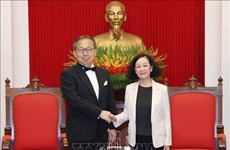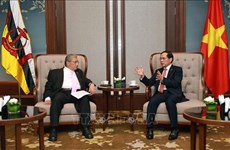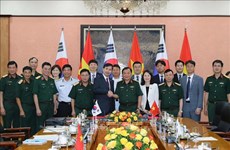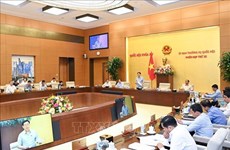Cooperation for security, development in East Sea discussed
About 150 domestic and international
delegates are gathering in Hanoi for a two-day international workshop
on cooperation on the East Sea.
About 150 domestic and international
delegates are gathering in Hanoi for a two-day international workshop
on cooperation on the East Sea.
This first international workshop on the East Sea held in Vietnam is a scientific forum to share views and consider the results of research on the East Sea from different viewpoints—legal, political and in terms of international relations.
Themed the East Sea: Cooperation for Regional Security and Development”, the workshop focuses on a full range of issues: the importance of the East Sea to regional peace and security, and its relevance to the strategies of concerned countries; the origin and development of on-going disputes, along with the implications of recent developments in regional peace and security; and the efficiency of existing regional mechanisms to reduce tension as well as the sharing of information to promote effective cooperation and trust-building measures to settle disputes among concerned parties.
Addressing the opening session on Nov. 26, Prof. Dr Duong Van Quang, President of the Diplomatic Academy of Vietnam, stressed that peace, cooperation and development continue to be the leading trend in current international relations. However, conflicts over sovereignty and territorial disputes concerning the East Sea have not been remediated.
“Recent developments--especially acts to assert sovereignty, together with unilateral actions to gain effective control as well as disputes over energy and other natural resources have further complicated the situation,” he said.
Against this backdrop, the parties concerned should act together and find effective measures to mitigate the adverse impacts of the situation in order to maintain a stable and peaceful environment, ensure freedom of navigation, and protect the environment and natural resources, and also work together on search and rescue efforts for fishermen encountering trouble in the East Sea . In sum, it has become more imperative than ever to strengthen cooperation, settle disputes and deal with challenges in order to maintain peace and stability in the East Sea, he went on to say.
The discussion should be straightforward, objective, constructive and forward-looking, Quang noted, adding that participants are ready to share information about their in-depth studies of the East Sea, contributing not only to improving understanding of the problem among scholars but also to raising the awareness of policy-makers and the public on problems in the area, hence intensifying efforts by regional countries for peace, security and development.
During the first two sessions, participants focused on the importance of the East Sea in the context of the new international environment. They agreed with the assessment that the East Sea is of significance in security and economic imperatives--including transport and natural resources--not only for nations on the rim, but also for those abroad.
The scholars noted that disputes over sovereignty and territory between parties concerned have been increasing. They attributed this to a number of causes: conflicts of national interest, a complicated history of dispute, different interpretations of the 1982 Law of the Sea as well as reports on the extended continental shelf; competitiveness between major countries; the appearance of more players in the East Sea; actions by naval forces, and nationalism directed towards the sovereignty issue. These were cited as the main forces driving the situation to become more complicated and more difficult to resolve.
The participants also said that there are signs that concerned countries are devoting attention to reducing tensions and seeking cooperation on East Sea-related issues—as demonstrated by the adoption of the Declaration on the Conduct of Parties (DOC) between ASEAN and China and cooperation in scientific studies and rescue efforts.
The delegates stressed efforts needed to accelerate cooperation in crisis prevention, the building of cooperation mechanisms, the settlement of non-traditional security challenges in the East Sea , and the enhancement of scientific workshops and experience sharing.
Among the participants at the workshop were 54 international delegates from 22 prestigious research centres in Indonesia, Malaysia, the Philippines, Thailand, Laos, China, the Republic of Korea, Japan, India, Australia, the US, Russia, the UK, France, Germany, Norway, Sweden and Canada./.
This first international workshop on the East Sea held in Vietnam is a scientific forum to share views and consider the results of research on the East Sea from different viewpoints—legal, political and in terms of international relations.
Themed the East Sea: Cooperation for Regional Security and Development”, the workshop focuses on a full range of issues: the importance of the East Sea to regional peace and security, and its relevance to the strategies of concerned countries; the origin and development of on-going disputes, along with the implications of recent developments in regional peace and security; and the efficiency of existing regional mechanisms to reduce tension as well as the sharing of information to promote effective cooperation and trust-building measures to settle disputes among concerned parties.
Addressing the opening session on Nov. 26, Prof. Dr Duong Van Quang, President of the Diplomatic Academy of Vietnam, stressed that peace, cooperation and development continue to be the leading trend in current international relations. However, conflicts over sovereignty and territorial disputes concerning the East Sea have not been remediated.
“Recent developments--especially acts to assert sovereignty, together with unilateral actions to gain effective control as well as disputes over energy and other natural resources have further complicated the situation,” he said.
Against this backdrop, the parties concerned should act together and find effective measures to mitigate the adverse impacts of the situation in order to maintain a stable and peaceful environment, ensure freedom of navigation, and protect the environment and natural resources, and also work together on search and rescue efforts for fishermen encountering trouble in the East Sea . In sum, it has become more imperative than ever to strengthen cooperation, settle disputes and deal with challenges in order to maintain peace and stability in the East Sea, he went on to say.
The discussion should be straightforward, objective, constructive and forward-looking, Quang noted, adding that participants are ready to share information about their in-depth studies of the East Sea, contributing not only to improving understanding of the problem among scholars but also to raising the awareness of policy-makers and the public on problems in the area, hence intensifying efforts by regional countries for peace, security and development.
During the first two sessions, participants focused on the importance of the East Sea in the context of the new international environment. They agreed with the assessment that the East Sea is of significance in security and economic imperatives--including transport and natural resources--not only for nations on the rim, but also for those abroad.
The scholars noted that disputes over sovereignty and territory between parties concerned have been increasing. They attributed this to a number of causes: conflicts of national interest, a complicated history of dispute, different interpretations of the 1982 Law of the Sea as well as reports on the extended continental shelf; competitiveness between major countries; the appearance of more players in the East Sea; actions by naval forces, and nationalism directed towards the sovereignty issue. These were cited as the main forces driving the situation to become more complicated and more difficult to resolve.
The participants also said that there are signs that concerned countries are devoting attention to reducing tensions and seeking cooperation on East Sea-related issues—as demonstrated by the adoption of the Declaration on the Conduct of Parties (DOC) between ASEAN and China and cooperation in scientific studies and rescue efforts.
The delegates stressed efforts needed to accelerate cooperation in crisis prevention, the building of cooperation mechanisms, the settlement of non-traditional security challenges in the East Sea , and the enhancement of scientific workshops and experience sharing.
Among the participants at the workshop were 54 international delegates from 22 prestigious research centres in Indonesia, Malaysia, the Philippines, Thailand, Laos, China, the Republic of Korea, Japan, India, Australia, the US, Russia, the UK, France, Germany, Norway, Sweden and Canada./.













